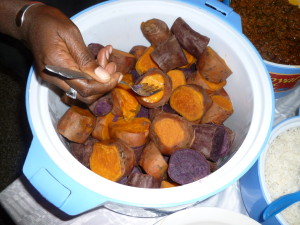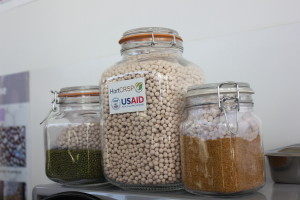Horticulture Innovation Lab Showcases Recent Research on Horticulture, Nutrition, and Postharvest at Two Washington, D.C. Events
The Feed the Future Innovation Lab for Collaborative Research on Horticulture (Horticulture Innovation Lab) hosted two separate events this July in Washington, D.C. showcasing their research on varied horticulture, nutrition, and postharvest topics. The events were both retrospective and forward looking, providing researchers the opportunity to share key findings from their work with the Horticulture Innovation Lab and gain insights from participants on knowledge gaps in the field on which new research is still needed. Participants included development practitioners, USAID staff, and researchers.

The Horticulture Innovation Lab’s Sustainable Technology for Orange and Purple Sweet potato (STOPS) project supports the production, marketing, and consumption of sweet potatoes as a means of addressing Vitamin A deficiency and improving food security.
The “Horticulture: Key Opportunities for Nutrition” forum on July 9, featured two Horticulture Innovation Lab projects led by Purdue University and Tuskegee University focused on increasing the production and consumption of nutrition-rich African Indigenous Vegetables and orange- and purple-fleshed sweet potatoes to promote economic growth and improve smallholders’ nutrition. The Nutrition-Africa and Nutrition-Asia Innovation Labs also presented recent findings from two projects led by Tufts University and the Johns Hopkins University on the nutritional benefits of consuming fruits and vegetables. All of these projects used knowledge about smallholders’ agricultural practices and cultural contexts to determine the best pathways for increasing production and consumption of horticulture crops to increase smallholders’ income and nutritional status. The sessions were held at the Association of Public and Land-grant Universities facilities.
The July 24th event “Postharvest in Horticulture: Reducing losses and improving quality to capture high-value crops” showcased postharvest technologies to reduce postharvest loss. Horticulture Innovation Lab projects led by University of California, Davis; Ohio State University; and Rutgers University are using innovative technologies like the CoolBot to provide smallholders with alternative ways to store and transport crops to reduce postharvest loss and maintain the quality of the crops for sale. Several of the projects also highlighted the importance of understanding and using social networks to disseminate information about postharvest handling. Jim Simon, Rutgers University, recipient of the BIFAD award for Scientific Excellence in 2012, discussed how his project in Zambia strengthened the value chain to scale up production of horticultural crops through public-private partnerships and the introduction of new postharvest technologies. The Horticulture Innovation Lab’s Regional Centers of Innovation, which provide technology training opportunities for smallholders in Honduras, Kenya, and Thailand, were also featured as just one of the Horticulture Innovation Lab’s capacity building activities. The sessions were held at the University of California, Washington Center.

Zeolite-based drying beads are used to dry and store horticultural seeds. The Horticulture Innovation Lab has introduced this technology through its projects in Nepal, Bangladesh, Kenya, Tanzania, Uganda and Rwanda.
Both meetings benefited from presentations by USAID representatives about the Agency’s current nutrition and postharvest portfolios. Mike Manske, USAID Nutrition Advisor, presented USAID’s new Multi-Sectoral Nutrition Strategy 2014-2025 which aims to make programs more nutrition-sensitive and offers new ways to consider the agriculture-nutrition nexus in programs. Jim Bowman, USAID Bureau for Food Security, provided an overview of USAID’s current investments in postharvest issues including the Horticulture Innovation Lab. The Feed the Future Food Security Innovation Center, leading USAID’s Feed the Future strategy, includes three new investments through the World Vegetable Center (AVRDC), the Post Harvest Loss Reduction Innovation Lab led by Kansas State University, and the Food Processing Innovation Lab led by Purdue University. Bowman also provided an overview of existing programs addressing postharvest like the Kenya Horticulture Competitiveness Project (KHCP), the Tanzania Agriculture Production Program (TAPP), and the new Feed the Future Post Harvest Loss Reduction Innovation Lab led by Kansas State University.
Visit the Horticulture Innovation Lab website to download presentations and read full summaries about each event:
Horticulture: Key Opportunities in Nutrition
Summary:http://horticulture.ucdavis.edu/main/events/dc_nutrition/summary.pdf
Event page and presentations: http://horticulture.ucdavis.edu/main/events/dc_nutrition/
Postharvest in Horticulture: Reducing losses and improving quality to capture high-value crops
Summary:http://horticulture.ucdavis.edu/main/events/dc_postharvest/summary.pdf
Event page and presentations:http://horticulture.ucdavis.edu/main/events/dc_postharvest/
